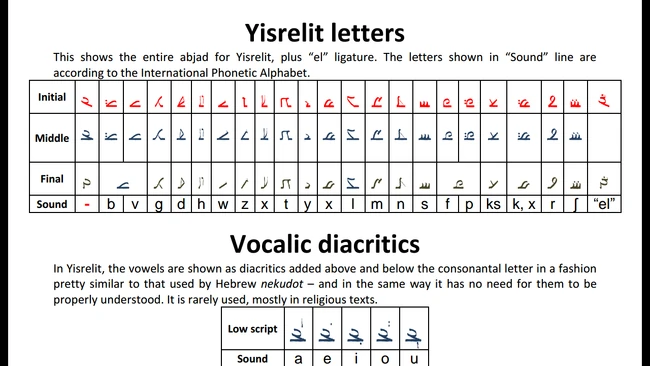Updates on this language and others can be seen at Gavriel's Conlangs. I'll stop updating them here and I'll do it on my personal blog.
Language spoken by the majority of the inhabitants of the Gelo planet and developed while Israelites and Philistines were taken from Earth and sent to this planet nearly 3000 years ago by some unknown alien race for purposes not yet known (several other people from around the Earth were "collected" and put on different planets that seem to be terraformed previous to their arrival). It's derived from Ancient Hebrew and its alphabet is a cursive abjad ressembling that used by Arabic; differently from the majority of semitical languages, it's written left-to-right.

Gelo planet as seen from the orbit
Kokhlakh Gelo man agula (Yisrelit), Plandos Gelos podis keklos (Ekroneké)
It's a three-consonant-root-based language, and most of the words are made this form. Verbal construction is quite simple and declines in gender and number, whenever it is in past, present and future tense or imperative. There is also the participle mode, which is used also as adjectives or to change the meaning of the verb with it.
Here follows the text of the National Poem (Hashirá shelé Leóm) as spoken in Yisrelit:

Conlang samples - Yisrelit
An audio sample of spoken Yisrelit
• Pronunciation
Hashirá Shelé Mesholá Galút Yisrél
'Ílu nedaĥím shelaná bé kiksá hashamáyim
Bé ereksím shár la'án naĥná mehugelím
Ét eréks shelaná naĥná ló shakaĥím
Lé hamelodá kól naĥná ĥizorím
• Translation
Hymn of the State of Galut Yisrel
Even if our remnants are at the end of the skyes
Between the lands where we were exiled to
Our land we did not forget
To our homeland we all shall return
| Yisrelit Yisr'elit | |||||||||||||
|---|---|---|---|---|---|---|---|---|---|---|---|---|---|
| Type | Semitical | ||||||||||||
| Alignment | LTR | ||||||||||||
| Head direction | |||||||||||||
| Tonal | No | ||||||||||||
| Declensions | No | ||||||||||||
| Conjugations | No | ||||||||||||
| Genders | 2: male and female | ||||||||||||
| Nouns decline according to... | |||||||||||||
| Case | Number | ||||||||||||
| Definiteness | Gender | ||||||||||||
| Verbs conjugate according to... | |||||||||||||
| Voice | Mood | ||||||||||||
| Person | Number | ||||||||||||
| Tense | Aspect | ||||||||||||
| Meta-information | |||||||||||||
| Progress | 0% | ||||||||||||
| |||||||||||||
| Creator | GavriFalcao | ||||||||||||
Classification and Dialects[]
Phonology[]
Consonants[]
Due to the writting system being an abjad, there are no written vowels; however there are letters that are used sometimes to mark a vowel, similar to Hebrew matres lectionis. For almost 500 years after the Great Liberation, the alphabet suffered changes and was modified little by little as more and more people gained access to education, until the invention of computer-analogs, and since then the Yisrelit suffered minor changes.
All consonantal letters - except for "ksadi" - represent one consonantal phoneme.
| Bilabial | Labio-dental | Dental | Alveolar | Post-alveolar | Retroflex | Palatal | Velar | Uvular | Pharyngeal | Epiglottal | Glottal | |
|---|---|---|---|---|---|---|---|---|---|---|---|---|
| Nasal | m | n | ||||||||||
| Plosive | p b | t d | k g | |||||||||
| Fricative | f v | s z | ʃ | x | h | |||||||
| Affricate | ||||||||||||
| Approximant | l | y | w | |||||||||
| Trill | r | |||||||||||
| Flap or tap | ' | |||||||||||
| Lateral fric. | ||||||||||||
| Lateral app. | ||||||||||||
| Lateral flap |
Vowels[]
There are no written vowels, however there are dialects in which the vowel phonemes "e" and "o" may change from closed to open. At the northernmost regions of the country, the "a" and "e" phonemes merged into "æ". Thus, these variations will be shown here as well.
There are no diphthongs in Yisrelit. The shva na was merged with "e", but sometimes became silent.
| Front | Near-front | Central | Near-back | Back | |
|---|---|---|---|---|---|
| High | a | ||||
| Near-high | æ | ||||
| High-mid | é | ó | |||
| Mid | i | ||||
| Low-mid | e | o | |||
| Near-low | |||||
| Low | u |
Writing System[]
There are 22 letters in Yisrelit abjad, and one joint letter "al+lam", which is promounced as "el". There are also diacritics that mark the sound of vowels, but they were mainly used as means of teaching the children and in reading ancient religious texts, today being used only to avoid double meaning in a phrase when needed.
Almost all letters have a inicial, intermediate and final form. For those willing for a PDF, see link: https://drive.google.com/file/d/1KSY675Gd_s1dW8YI5gUFoP5wP9XWcZb3/view?usp=drivesdk

